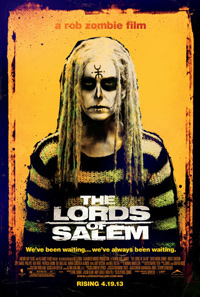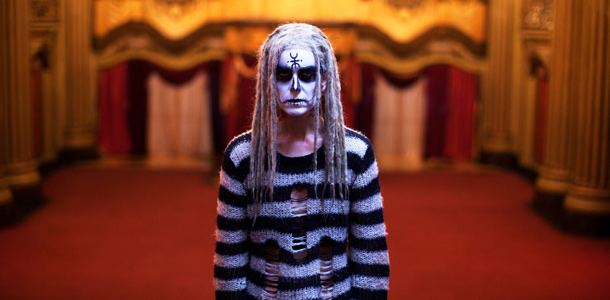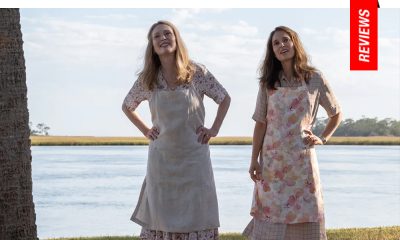Reviews
The Lords of Salem | Review
Burn, Witch, Burn: Zombie Conquers His Cross to Bear
 Don’t be so sure of what to expect when walking into Rob Zombie’s latest feature, The Lords of Salem, at once a familiar homage to genre classics past at the same time it’s building an invasively sordid atmosphere all its own. Zombie fans may very well be disappointed, especially if you find yourself among the many champions of the churlishly exploitational elements of some of his more prized entries, like 2005’s The Devil’s Rejects (where Lynyrd Skynyrd’s Free Bird at least gets used for appropriate effect, a track ill abused in fare by Robert Zemeckis and Cameron Crowe), as Zombie turns in a slower paced and decidedly mature effort that, gloriously, features one of the grandest unforgettable finales in a film of its nature.
Don’t be so sure of what to expect when walking into Rob Zombie’s latest feature, The Lords of Salem, at once a familiar homage to genre classics past at the same time it’s building an invasively sordid atmosphere all its own. Zombie fans may very well be disappointed, especially if you find yourself among the many champions of the churlishly exploitational elements of some of his more prized entries, like 2005’s The Devil’s Rejects (where Lynyrd Skynyrd’s Free Bird at least gets used for appropriate effect, a track ill abused in fare by Robert Zemeckis and Cameron Crowe), as Zombie turns in a slower paced and decidedly mature effort that, gloriously, features one of the grandest unforgettable finales in a film of its nature.
We open in 1696 Salem, where a witch, Margaret Morgan (Meg Foster) and her coven are about to be burned at the stake. But not before Marge is able to place a curse on the ignorant denizens. In present day, radio DJ Heidi Hawthorne (Sheri Moon Zombie), lives a peaceful existence with a job she loves. A recovering drug addict, she converses mostly with her creepy landlady, Lacey (Judy Geeson) and co-workers Herman (Jeff Daniel Philips) and Herman (Ken Foree), one of which she has a more adult entanglement with. One day, she receives a mysterious LP at work, personally addressed to her. She plays the record first at home, which features a creepy instrumental track that causes an adverse reaction in Heidi. When she brings it to work and plays it on the air, the track hypnotizes the female denizens of Salem. Other bizarre figures pop up, such as Lacey’s weird sisters, Sonny (Dee Wallace) and Megan (Patricia Quinn). A published witch scholar (Bruce Davison), who had recently visited the radio station as guest, gets wise to the ways of the mysterious record and tries to warn Heidi of the danger she’s in. And then things start getting real weird.
Genre fans should definitely lap up The Lords of Salem, which begins with an opening that recalls Mario Bava’s classic Black Sunday (1960), where the world was first introduced to Barbara Steele as a staked mask gets pounded into her face with a gavel. Zombie again casts wife Sheri Moon as the female lead, and finally she doesn’t figure as an exploited composite of hypersexualized femininity. A dreadlocked mousy type, whose name puts one in mind of that braided girl from the Alps (and Nathaniel Hawthorne), she’s a fully fleshed human character, replete with a fantastic bedroom, where she sleeps under the famed still of George Melies’ A Trip to the Moon (1902).
For his supporting cast, Zombie assembles a spectacular amount of genre stalwarts, where we have Judy Geeson, Patricia Quinn and Dee Wallace as a trio of witches, and the cat-eyed Meg Foster deliciously on hand as the haggard crone running the show. Maria Conchita Alonso and Bruce Davison get less spectacular screen time, and Davison is saddled with one of the film’s most clichéd sequences. While Zombie lifts some obvious moments from fare like Rosemary’s Baby (1969), the classically simple set-up and mounting tension aligns this was something like the Chrisopher Lee headlined Horror Hotel (1960).
Cinematographer Josh Trost, often stymied with middling studio fare, gets a chance to show off here, moving the action from Heidi’s omnipresent gloom of an apartment complex into a hellacious psychedelic showdown, that may be ultimately predictable, but is stylistically, and excitingly original. A tentacled demon baby and naked hags usher us into a surreal nightmare, culminating in final moments of delectably striking imagery that, with a melding of visual artistry and music (The Velvet Underground’s All Tomorrow’s Parties) recalls the experimental work of Kenneth Anger. The Lords of Salem is an exciting change of pace for Rob Zombie, and his latest proves a little ingenuity can go a long way.


































